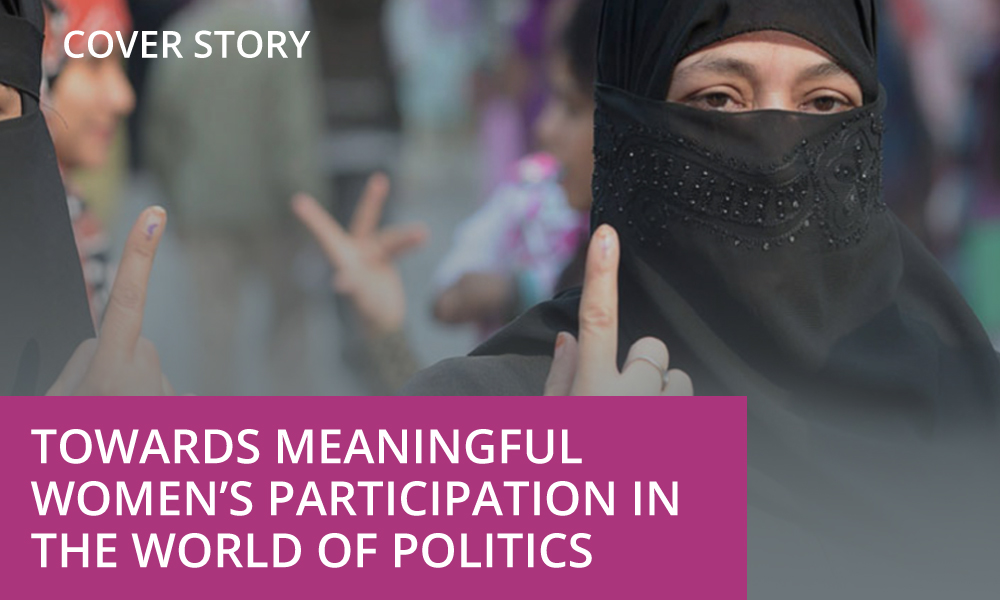Women make up half the world, sometimes more, sometimes, sadly, less. Yet, in contrast, their voices are silenced, suppressed and alienated from the mainstream in all major spheres of public life. India is no different. The extraordinary talents of women are often forgotten. Yet, despite everything, they power through and find ways to thrive. Indian politics too is a similar story. Let us read on to find what constitutes meaningful participation in political life for women, of all shades and backgrounds.
Nationally speaking, two in every three women reported having no freedom at all with respect to political participation, according to a recent study by Lokniti-Centre for the Study of Developing Societies (CSDS) and German foundation Konrad Adenauer Stiftung (KAS). When asked if they would ever consider a career in politics, only a quarter of respondents showed interest, and the respondents mostly cited societal patriarchal norms, household responsibilities, lack of interest, awareness, or education as impediments. Additionally, they cited a common perception that only a woman who came from an elite background, or was upper caste, or had a political family behind her could succeed..
Another consequential debate is around the politics of representation. Representation is only step one: the entry point to a bigger platform and wider debate. No one disagrees that women’s representation is important. But what the women do is equally, if not more important. The token entry of one Muslim woman to Parliament or an assembly will not change the social reality of Muslim women. Women candidates are often celebrated as a mark of the glass ceiling shattering. But little happens later. It is much more important to push for meaningful representation and to ensure that when one woman climbs up the ladder, she makes it easier for others to do so; rather than celebrating the ‘firsts’, it is important to turn the solitary figure into a community who can effect actual change.
In short, women in Indian politics have a long way ahead. The Karnataka elections were a sigh of relief for many who worked tirelessly to ensure that the politics of hatred was squarely defeated. Congress’ focus on women, including as part of its “5 promises”, also paid off.
Women cannot be ignored in politics. They make or break the fortunes of political parties and often consolidate around vital social issues, even if they are otherwise splintered by their other identities, such as caste, religion, etc. Even if they do make it to the representative bodies, their task has only begun. Gender bias is deeply embedded in Indian society, and consequently, politics. In a society that thrives on cheap humour about the intelligence levels of women, whether women can drive safely or not, or whether menstruation renders a woman crazy, being a political leader is a challenge in itself. It is a well-known phenomenon that even in local seats reserved for women, it is often the male family members, like spouses or fathers who are treated as the ‘real’ candidates and are hailed as such. The women’s reservation bill has been in the wings for many decades. However, it is a fact that such bills may only benefit elite women and those belonging to the ‘right’ caste-class-religion axes unless it has internal reservation or some way to ensure access and equity for all diverse groups.
‘Inclusion’ is not enough if the seat at the table is where it stops. The table has to be re-designed; it has to accommodate everyone irrespective of their social locations, backgrounds or vulnerabilities. Marginalised groups in Indian politics will no longer settle for crumbs, but demand equitable access so that they can effect change. Take for example, the issue of maternal mortality. There is no single cause of death and disability for men aged 15-44 that is close in magnitude to maternal mortality. (Bhalotra et al, 2023). Including women in politics has a direct relationship with the fall in maternal mortality in many countries, perhaps because women are directly aware of its consequences, and have creative ideas of how to solve it. Similarly, when political representatives of marginalised social groups become part of active politics, they can suggest ways to sort out problems that they may have unique insights into due to their experience. Of course, sensitisation is not their burden to bear alone, and people of all communities must sharpen their vision towards the silenced issues of our society.
In the past year or so, we witnessed Muslim women and girls being stripped of their hijabs and their fundamental right to education. We can only hope that governments that have ridden back to power on the back-breaking work of civil society interventions and ground work, will remember that they owe a promise of redressal to such citizens.


0 Comments